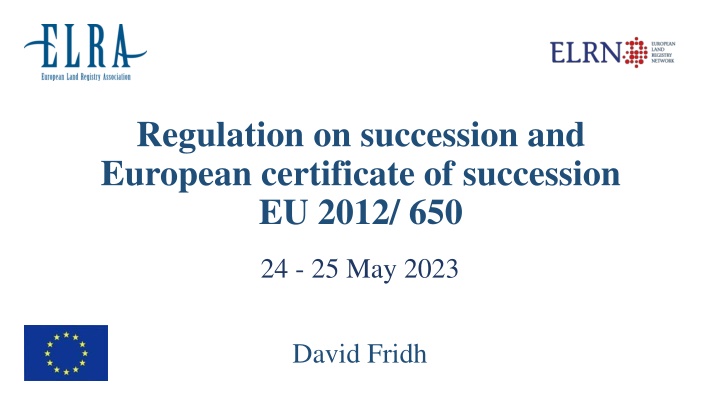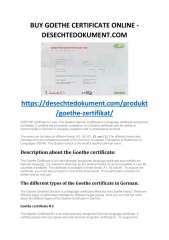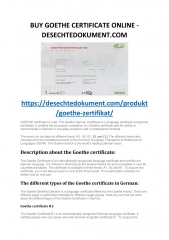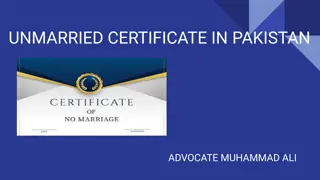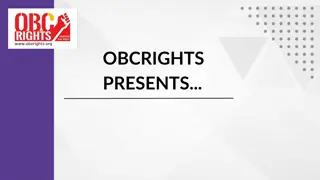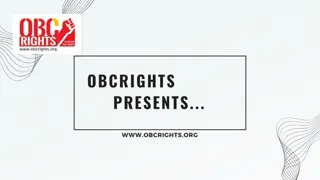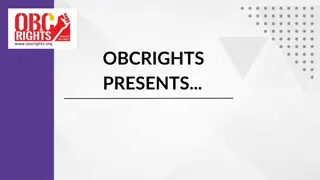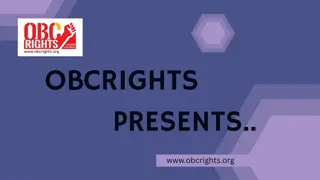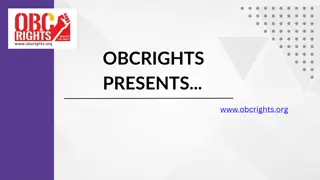European Certificate of Succession Regulation Analysis
Analyzing the implications of the European Certificate of Succession (ECS) regulation on land registers and registrars' work, including exclusion from land registers, the validity of ECS, remaining obstacles, and practical challenges faced by member states in implementing ECS for property registration.
Download Presentation

Please find below an Image/Link to download the presentation.
The content on the website is provided AS IS for your information and personal use only. It may not be sold, licensed, or shared on other websites without obtaining consent from the author.If you encounter any issues during the download, it is possible that the publisher has removed the file from their server.
You are allowed to download the files provided on this website for personal or commercial use, subject to the condition that they are used lawfully. All files are the property of their respective owners.
The content on the website is provided AS IS for your information and personal use only. It may not be sold, licensed, or shared on other websites without obtaining consent from the author.
E N D
Presentation Transcript
Regulation on succession and European certificate of succession EU 2012/ 650 24 - 25 May 2023 David Fridh
Previous work about European certificate of Succession (ECS)
Need for more a wider approach The board of ELRA considers the regulation on Successions as one of the main instruments issued by the EU regarding private law We have proposed a more thorough investigation about the regulation and its implications on the land register and work of land registrars We hope to be able to contribute to the Commissions report in 2025 (article 82)
Aim, Content and effects of ECS Exclusion of land registers and contradictions Article 1.2.k (rights in rem) and 1.2.l (recordings in a register) The regulation excludes from its scope the procedure to make an entry in the LR that is ruled by national law Recital 18 also states: the European Certificate of Succession issued under this regulation should constitute a valid document for the recording of succession of property in a register of a Member State.
ECS as an important legal document Article 69.5 The Certificate shall constitute a valid document for the recording of succession property in the relevant register of a Member State, without prejudice to points (k) and (l) of Article 1(2).
Conclusions Previous research by ELRA showed that a number of member states did not approve entries in the LR on the basis of a ECS despite art 69.5. In 2020 it was declared that in theory all countries now accept ECS as a valid document for registration However, some practical obstacles still remain
Remaining obstacles regarding ECS Which eventual additional documents or complementary requirements could be requested by LR? Information about the number or designation of the property (C 354-21) Information about the distribution of the property between the heirs (shares) Official translations of the European Certificates of Succession Other? Would the Certificate be rejected by your registration authorities in the event of inadequate completion, mistakes or inaccuracies? Or would you request clarifications?
Interesting cases C-354/21 (identification of the property) Requirements in national legislation regarding land registration are valid
Interesting cases C-102/2018 Background: A German national, whose last habitual residence was in Cologne (Germany), died on 2 June 2017. She owned property in in Germany, Italy and Switzerland. Her only living heirs were the descendants of her deceased brother. By a will drawn up before a notary, she revoked her previously notarised wills, named the Congregazione Benedettina Sublacenze, established in Rome (Italy), as her sole heir and appointed one person as her executor. Pursuant to Article 65(1) of Regulation No 650/2012, the executor applied to the Local Court in Cologne on 16 October 2017 on the basis of a notarised instrument for a certificate in respect of the deceased s estate located in Italy, but did not use Form IV in Annex 4 to Implementing Regulation No 1329/2014 ( Form IV ). By letter, the Local Court in Cologne requested that the executor should use Form IV and include it in his application for the certificate. The executor refused to comply with that request and asserted that he was free but not required to use that form. By order of 16 November 2017, the court rejected the application for the certificate on the ground that Form IV had not been used and that therefore the application had not been lodged in the prescribed form.
C-102/2018 Is the use of the form as set out in Annex 4 mandatory or merely optional for the purposes of an application for a certificate under Article 65(2) of [Regulation No 650/2012] in accordance with Article 1(4) of [Implementing Regulation No 1329/2014]? From a literal interpretation of Article 65(2) of Regulation No 650/2012, read in conjunction with Annex 4 to Implementing Regulation No 1329/2014, that, for the purposes of an application for a certificate, the use of form IV is optional. Article 65(2) of Regulation (EU) No 650/2012 of the European Parliament and of the Council of 4 July 2012 on jurisdiction, applicable law, recognition and enforcement of decisions and acceptance and enforcement of authentic instruments in matters of succession and on the creation of a European Certificate of Succession and Article 1(4) of Commission Implementing Regulation (EU) No 1329/2014 of 9 December 2014 establishing the Forms referred to in Regulation No 650/2012 must be interpreted as meaning that, for the purposes of an application for a European Certificate of Succession, within the meaning of Article 65(2) of Regulation No 650/2012, the use of Form IV in Annex 4 to Implementing Regulation No 1329/2014 is optional.
Conclusion C-354/21 The use of form V in Annex 5 to that implementing regulation is mandatory C-102/2018 The use of Form IV in Annex 4 to that implementing regulation is optional Result Even if the use of annex 4 is not mandatory for an application of European certificate of succession, the lack of some information in the certificate may lead to the consequence that it can not be used as a legal document to register rights in another country s land register It can therefore be hard for an applicant to foresee if an ECS will be accepted for registration
